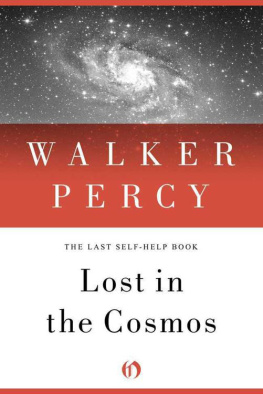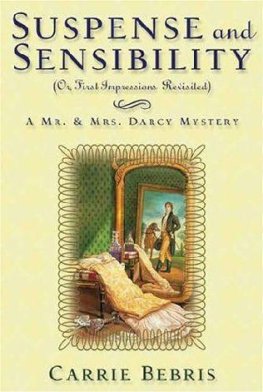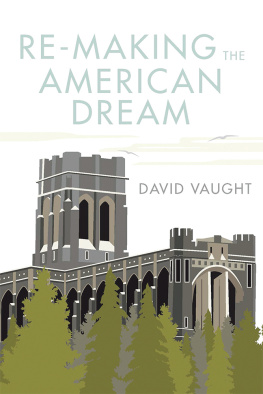The Last Gentleman
Walker Percy

FOR BUN
Ifa man cannot forget, he will never amount to much.
Sren Kierkegaard, Either/Or
We know now that the modern world is coming to an end at the same time, the unbeliever will emerge from the fogs of secularism. He will cease to reap benefit from the values and forces developed by the very Revelation he denies Loneliness in faith will be terrible. Love will disappear from the face of the public world, but the more precious will be that love which flows from one lonely person to another the world to come will be filled with animosity and danger, but it will be a world open and clean.
Romano Guardini, The End of the Modern World
The characters in this novel are fictional. No real persons are portrayed. The places do not necessarily correspond to geography. That is to say, New York is New York, but localities in Alabama, Mississippi, and Louisiana have been deliberately scrambled. For example, the Southern city herein set forth bears certain resemblances to Birmingham. But the nearby university is more like the state institution in Mississippi. The town of Shut Off, Louisiana, is not across the Mississippi River from Vicksburg. These liberties are taken as a consequence of my impression that this region as a whole, comprising parts of Alabama, Mississippi, and Louisiana, shares certain traits which set it apart from much of the United States and even from the rest of the South.
.
ONE FINE DAY IN early summer a young man lay thinking in Central Park.
His head was propped on his jacket, which had been folded twice so that the lining was outermost, and wedged into a seam of rock. The rock jutted out of the ground in a section of the park known as the Great Meadow. Beside him and canted up at mortar angle squatted a telescope of an unusual design.
In the course of the next five minutes the young man was to witness by chance an insignificant, though rather curious happening. It was the telescope which became the instrument of a bit of accidental eavesdropping. As a consequence of a chance event the rest of his life was to be changed.
He was an unusual young man. But perhaps nowadays it is not so unusual. What distinguished him anyhow was this: he had to know everything before he could do anything. For example, he had to know what other peoples infirmities were before he could get on a footing with them.
Most people would have forgotten the incident in question in a weeks time. But he did not. His life had come to such a pass that he attached significance to it. For until this moment he had lived in a state of pure possibility, not knowing what sort of a man he was or what he must do, and supposing therefore that he must be all men and do everything. But after this mornings incident his life took a turn in a particular direction. Thereafter he came to see that he was not destined to do everything but only one or two things. Lucky is the man who does not secretly believe that every possibility is open to him.
It was a beautiful day but only after the fashion of beautiful days in New York. The sky was no more than an ordinary Eastern sky, mild and blue and hazed over, whitened under the blue and of not much account. It was a standard sky by which all other skies are measured. As for the park, green leaves or not, it belonged to the animal kingdom rather than the vegetable. It had a zoo smell. Last summers grass was as coarse and yellow as lions hair and worn bare in spots, exposing the tough old hide of the earth. The tree trunks were polished. Bits of hair clung to the bark as if a large animal had been rubbing against them. Nevertheless, thought he, it is a good thing to see a park put to good hard use by millions of people, used and handled in its every square inch like a bear garden.
A 35-millimeter camera had been fitted to the telescope in place of the in-line ocular, but a lateral eyepiece allowed him to lean over from time to time and take a squint. There sprang into view a section of the cornice of a building, no doubt one of the hotels along Central Park South. But so powerful was the instrument that it was hard to say which building was being looked at. It was as if the telescope created its own world in the brilliant theater of its lenses.
He was waiting for the peregrine.
The day before, he had seen it but not photographed it. The falcon had abandoned its natural home in the northern wilderness and taken up residence on top of the hotel. From this eyrie it preyed on the fat pigeons of the park. Along the cornice it would strut, cock a yellow eye down at the great misty rectangle (the eye sunk and fierce in its socket and half eclipsed by the orbit of bone), and down it would come smoking, at two hundred miles an hour, big feet stuck out in front like a Stuka, strike the pigeons in mid-air with a thump and a blue flak-burst of feathers.
The peregrine did not return to his perch. As the young man made ready to unlimber his telescope, he loosened the thumbscrew and the barrel dropped to the horizontal. He took another look. Being of both a scientific and a superstitious turn of mind and therefore always on the lookout for chance happenings which lead to great discoveries, he had to have a last lookmuch as a man will open a telephone book and read the name at his thumbnail.
There in the telescope sat a woman, on a park bench, a white woman dark as a gypsy. She held a tabloid. Over her shoulder he read: parley fails.
But when he looked up he couldnt find her. The telescope was pointed toward the southeast, where a thicket of maples bordered the Great Meadow. She could only be there. Yes, now he saw: the telescope looked toward a leafy notch and through it to the summit of one of the little alps which overlook the Pond.
There she was, not twenty feet away and shimmering slightly in the pressed optic air as if she sat at the bottom of a sunlit ocean. Her coarse hair gave off rainbows. One arm was flung along the back of the bench, the hand smudged with newspaper ink. She was a neat stocky woman with a shock of hair and a handsome if somewhat meager face, like the face of an athlete, as if all strength and beauty had gone first to her body.
The woman was doing something. The soiled left hand dropped behind the bench, where by any calculation of hers it could not be seen, for the bench sat on the slope of an alp and there was nothing behind it but treetops. The blue hand felt its way down along a partition. It was an old-style bench, the sort built many years ago of a porous tufalike concrete in which pebbles had been set like raisins in a cake. A sad yellow 1901 concrete it was, enough to strike a pang to the heart. The seat was divided into thrones by scroll-shaped partitions which arched up and over to the rear, where they fastened the back into the bench. At the bottom the scroll was mortised into the bench by an ornamental tenon. Down crept the hand along the scroll. As he watched, the hand shattered into rainbows and disappeared. In another second the woman herself was gone, vanishing into the blue nimbus which rimmed the circle of light
It did not take him long to act. Often nowadays people do not know what to do and so live out their lives as if they were waiting for some sign or other. This young man was such a person. If a total stranger had stopped him this morning on Columbus Circle and thrust into his palm a note which read: Meet me on the NE corner of Lindell Blvd and Kings Highway in St. Louis 9 A.M.next Thursdayhave news of utmost importance, hed have struck out for St. Louis (the question is, how many people nowadays would not?).
The hillock was easy to find. The bench overlooked the Pond and, beyond, the Grand Army Plaza. To the north the slope fell away abruptly into a screen of privet and poplar. Below, workmen were setting out folding chairs in the plaza and draping bunting over scaffolding in preparation for a patriotic ceremony.
Next page














